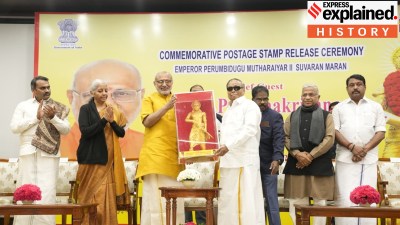Joshimath: ISRO pulls down report, Govt tells top expert bodies not to speak to the media
Unfortunate, says ex-CM Rawat, there is no panic, all agencies should pool in
 A resident shows cracks that appeared in a house in Joshimath. (PTI)
A resident shows cracks that appeared in a house in Joshimath. (PTI) The National Disaster Management Authority (NDMA) has instructed a dozen government institutes and scientific organisations not to interact with the media or share data on social media regarding ground subsidence at Joshimath in Uttarakhand, saying their “interpretation of the situation” is “creating confusion not only among affected residents but also among citizens of the country”.
A preliminary report released Friday by the Indian Space Research Organisation’s National Remote Sensing Centre, showing a “rapid subsidence” event in parts of Joshimath, was taken down from the NRSC website.
According to the preliminary report, while “slow subsidence” up to 8.9 cm within Joshimath town was recorded over a period of 7 months since April 2022, Cartosat-2S satellite data acquired by ISRO recorded “rapid subsidence” of around 5 cm in just 12 days since December 27.
On Saturday, NRSC officials were not available for comment on why the report had been taken down. An email sent to the ISRO spokesperson did not elicit a response.
But Uttarakhand cabinet minister Dhan Singh Rawat told The Sunday Express that there was panic in Joshimath over the ISRO report, so he spoke to the ISRO director and asked him to remove the report.
“There was this thing on the website that there is land subsidence, and that created a lot of panic here (in Joshimath). This is why I asked him to only give official statements and not post anything on the website just like that… I asked them to only speak the truth… and if that is not the case, then remove it from the website. I requested them to give official reports and not create panic unless there is an official report,” Rawat said.
He said the NDMA letter was issued after the Uttarakhand government told the agency that any report regarding Joshimath should first get approval from the Centre or the state government.
“We have requested the NDMA. I have personally spoken to the ISRO director… The main motive behind this is to make sure there is no panic among people. People here are already troubled,” Rawat said.
The NDMA office memorandum prohibiting interaction with the media or sharing of data on social media regarding Joshimath was issued Friday. It was marked to the Director, Central Building Research Institute (CBRI), Roorkee; DG, Geological Survey of India (GSI), Kolkata; Director, NRSC-ISRO, Hyderabad; Chairman, Central Ground Water Board (CGWB), New Delhi; Surveyor General of India, SOI, Dehradun; Director, Indian Institute of Remote Sensing (IIRS), Dehradun; Director, National Geophysical Research Institute (NGRI), Hyderabad; Director, National Institute of Hydrology (NIH), Roorkee; Director, Wadia Institute of Himalayan Geology (WIHG), Dehradun; Director, IIT Roorkee; ED, National Institute of Disaster Management (NIDM), New Delhi; Secretary, Uttarakhand State Disaster Management Authority (USDMA), Dehradun.
The NDMA said in its office memorandum: “It is observed that various Government Institutions are releasing data related to the subject matter in social media platforms and also they are interacting with media with their own interpretation of the situation. It is creating confusion not only among affected residents but also among citizens of the country.”
It stated that “the issue was highlighted during a meeting chaired by Honourable Union Home Minister on 12th January 2023”.
“Accordingly it was also discussed during a meeting chaired by Member Secretary, NDMA, held on 12th January 2023. Also an expert group has been formed for assessment of ground subsidence at Joshimath,” it stated.
“You are requested to sensitize your organization about this matter and refrain from posting anything on the media platform until the final report of the expert group is released by NDMA,” the NDMA said.
Questioning the NDMA order and the Uttarakhand government’s role in it, state Congress president Karan Mahara accused the state government of “hiding the fact that they never listened to the experts and none of the expert suggestions were ever implemented”.
Former Chief Minister Harish Rawat said, “This is unfortunate. What is happening in Joshimath is something that requires a lot of public awareness. All kinds of views should come. Only when all kinds of views and suggestions will come to the front, the other agencies will get into crystallising things. If alternate views are not welcomed, then this is not a good thing.”
“In this time of advanced technology, how are you going to hide what the ISRO has found? If not ISRO, then satellites of other countries will notice the same things. Those reports will then be published outside India and reach us. Wouldn’t that cause embarrassment to the ISRO and the country? Information coming from outside sources will create more panic. If the ISRO has something to say, that should reach the public. There is no panic in Joshimath. We assure you that we will work together on this and ensure the situation remains calm,” Rawat said.







